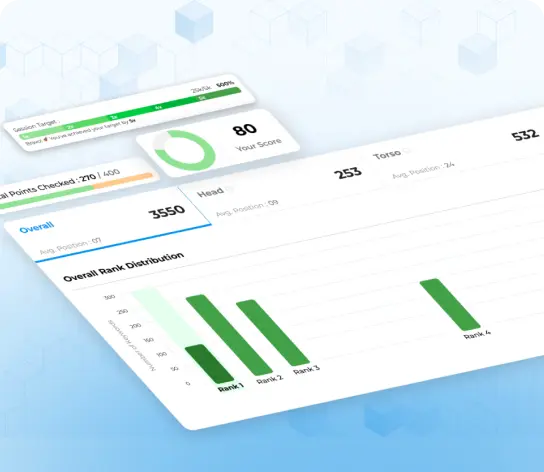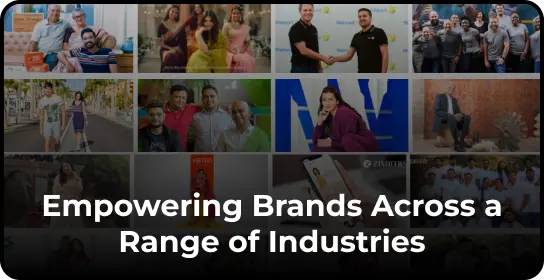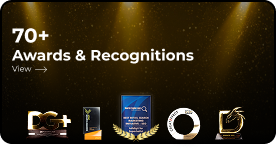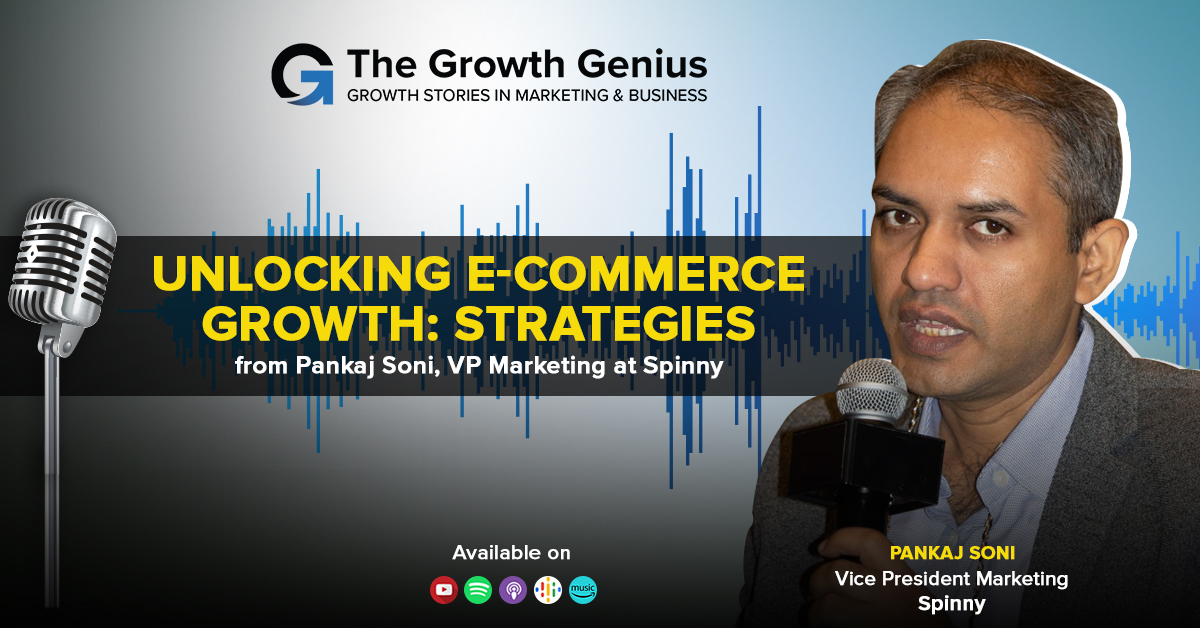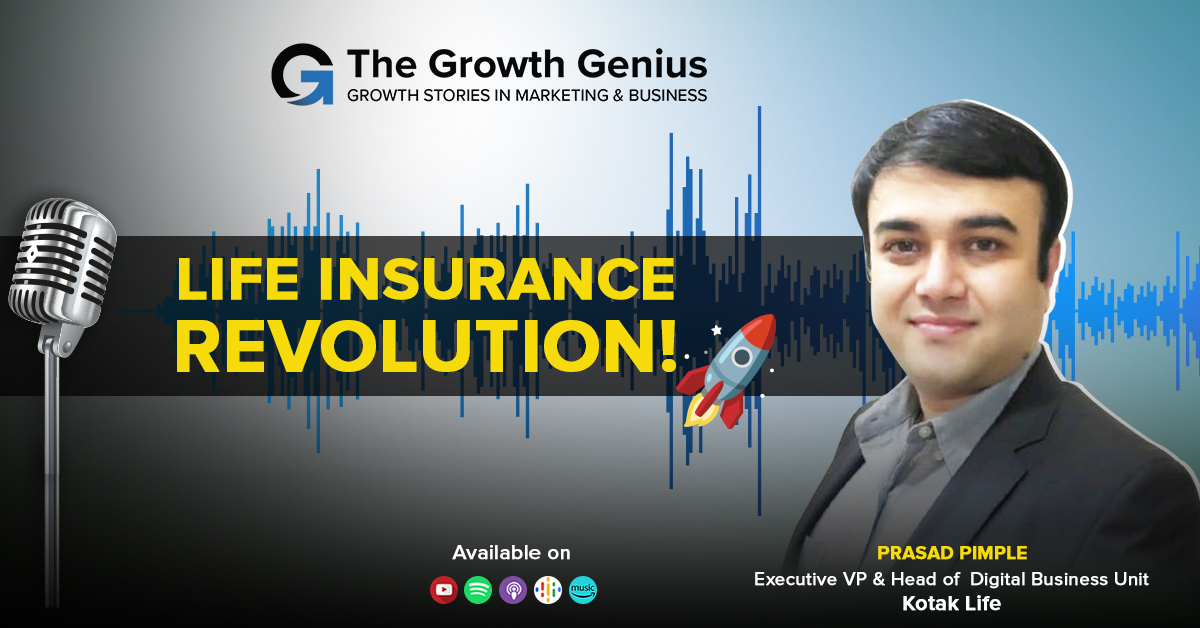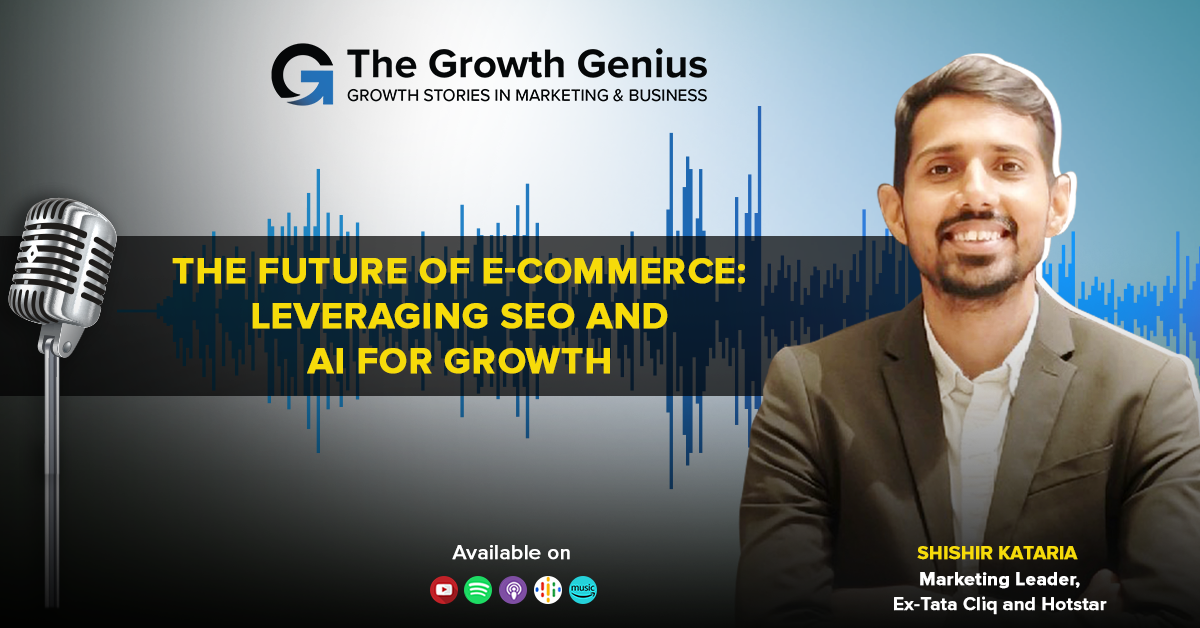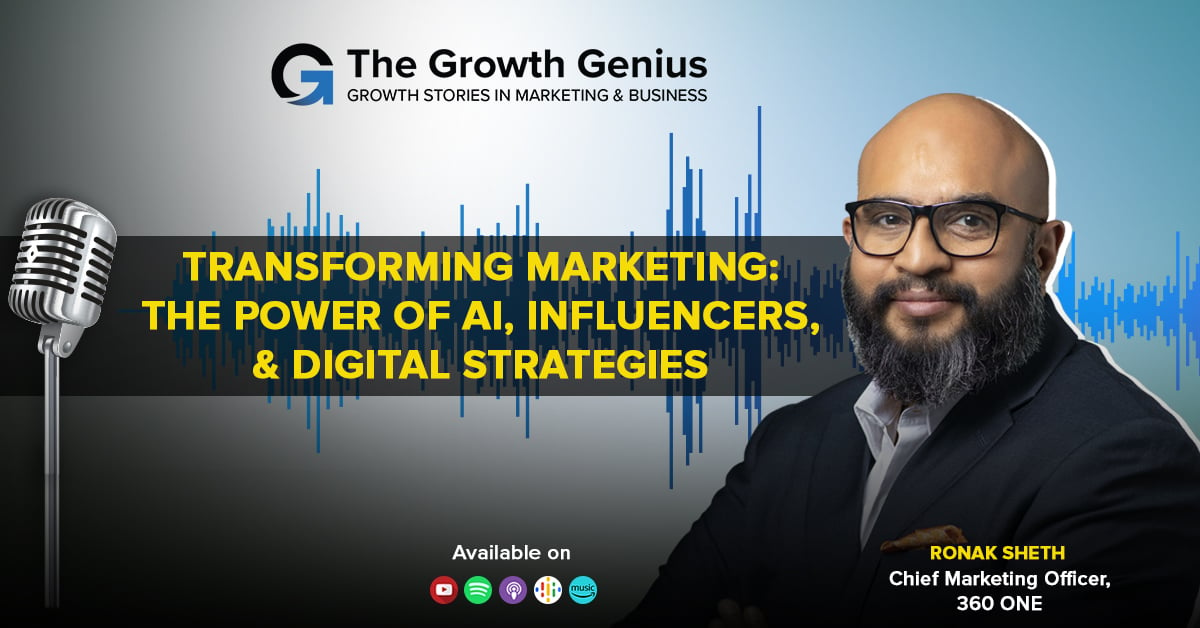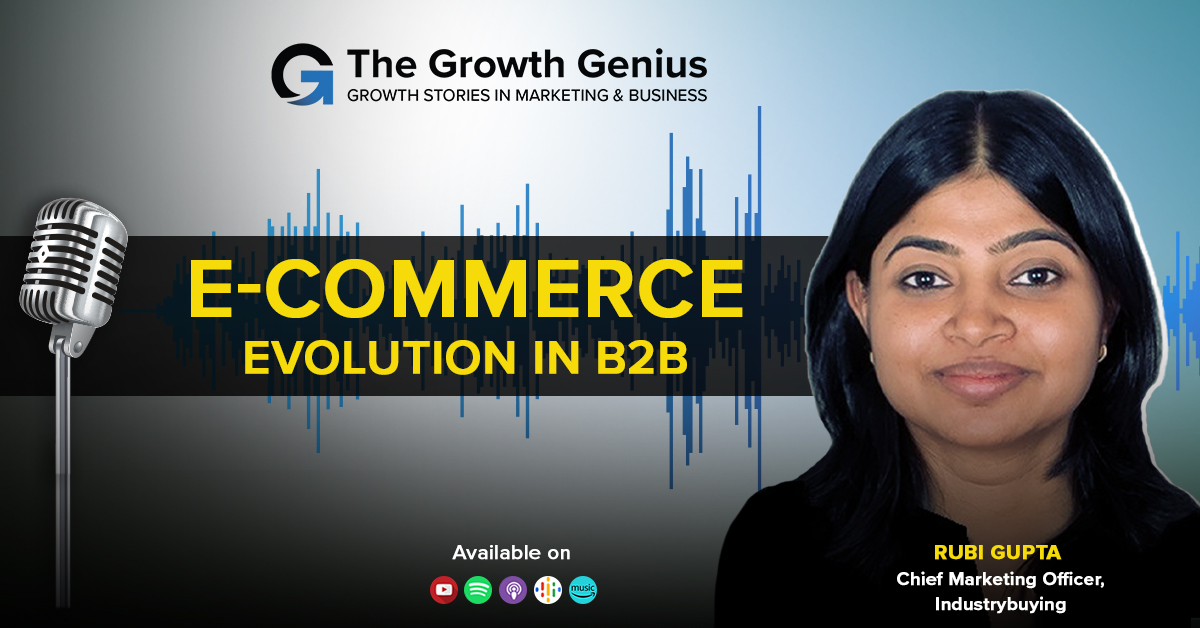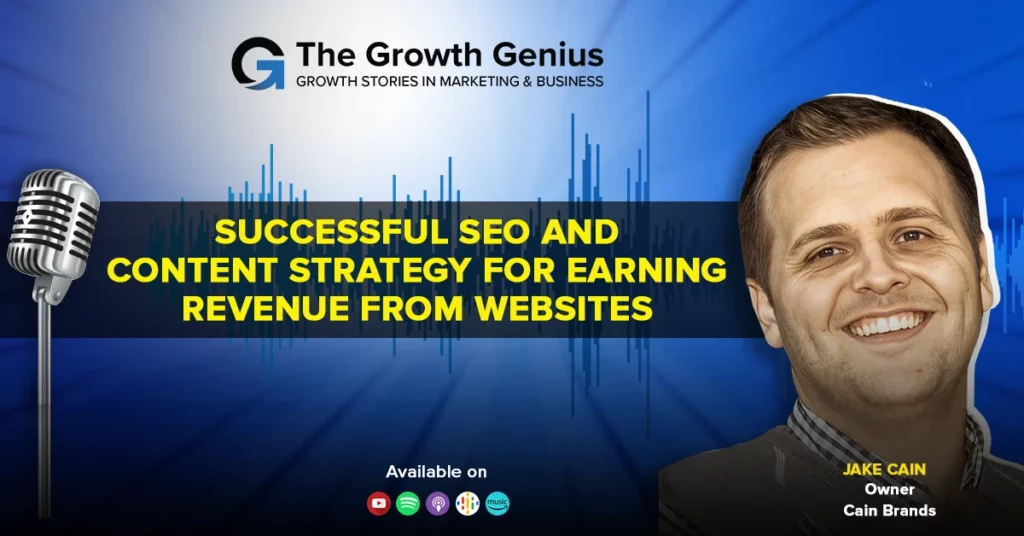Let’s Connect & Accelerate Your Organic Growth
- Your data is properly secured encrypted by SSL
Listen on your Podcast app
Summary
Explore the dynamic growth strategies employed by Jake Cain, unveiling a roadmap to success that revolves around comprehensive growth strategies. With a profound emphasis on data-driven decision-making, Cain’s approach aligns with modern business demands, where growth strategy takes center stage. By seamlessly integrating innovative techniques into his framework, he has sculpted a thriving online ecosystem that propels brand visibility and engagement. His growth strategies transcend mere theory, offering actionable insights on how to effectively marry SEO services, content excellence, and strategic outreach. Through his journey, Cain exemplifies the pivotal role of a well-crafted growth strategy, illuminating the path for businesses seeking to navigate the ever-evolving digital landscape and achieve lasting success.
Key Take Aways
- Focus on data-driven decision-making: Jake Cain emphasizes the importance of using data to drive marketing strategies. Digital marketers should rely on analytics and insights to understand customer behavior, identify trends, and optimize campaigns for better results.
- Prioritize user experience: According to the blog, providing a seamless and enjoyable user experience is crucial for digital marketers. This includes optimizing website speed, mobile responsiveness, and ensuring easy navigation to enhance customer satisfaction and increase conversions.
- Leverage the power of content marketing: Content marketing plays a significant role in driving organic traffic and engaging customers. Jake Cain suggests creating high-quality, relevant, and valuable content that resonates with the target audience. This can help build brand authority, increase website visibility, and attract potential customers.
- Utilize social media platforms effectively: Social media platforms offer immense opportunities for digital marketers to reach and engage with their target audience. Jake Cain advises leveraging social media channels strategically, understanding the platform’s demographics, and tailoring content accordingly to maximize engagement and brand exposure.
- Implement SEO best practices: Search engine optimization (SEO) is crucial for improving website visibility and driving organic traffic. The blog highlights the importance of optimizing website structure, using relevant keywords, creating quality backlinks, and staying updated with search engine algorithm changes to rank higher in search results.
- Embrace automation and technology: Automation tools and technology can significantly streamline marketing processes and improve efficiency. Jake Cain suggests digital marketers embrace automation for tasks like email marketing, social media scheduling, and data analysis. This allows marketers to focus on strategy and creativity while saving time and resources.
Read Transcript
Jake Cain: I try to buy sites from people where they’re already making some money and getting some traffic, and then use my team and some of my strategies to add content to that site and then better optimize it. I find that SEO is for me; you could almost read too much about it, and it gets overwhelming. At least that’s how I’ve found it.
Kaushal Thakkar: Welcome to The Growth Genius podcast, brought to you by Infidigit, an organization focused on search engine optimization and conversion rate optimization. I am Kaushal Thakkar, Founder of Infidigit, and your host for this show. Today we have the pleasure of having with us the Founder and Owner of Cain Brands, Jake Cain. Jake creates and acquires online businesses, usually through his websites, and then uses content, strategy, and SEO to make them more profitable. I met him recently at the DAA Summit in Chicago and was impressed with his accomplishments. Let’s welcome Jake Cain. Hi, Jake. How are you doing today?
Jake: – Hey, I’m doing great. Thank you so much for having me. I appreciate it.
Kaushal: – Thank you. And how was the road trip back home?
Jake: – Oh, it was fantastic. So, the event was in Chicago; I’m in Cincinnati, which is just a short five-hour drive away. Not too bad, but yeah, it was interesting. This is the first time I’ve been to a conference of that nature, related to privacy, advertising, and things like that. So, it was fun getting to share my story a little bit, but I also met some interesting people and got to go to a Cubs game at Wrigley Field, which was fun. So, yeah, we made a nice trip out of it. It was great.
Kaushal: – That’s really good. And Jake, tell us a little more about Cain Brands.
Jake: – Yeah, sure. So, Cain Brands basically is kind of the umbrella under which I own about a dozen or so different websites and other little projects and shiny objects that I come up with. I have about a team of probably 20 or so writers and editors that’ll fluctuate a little bit, as well as people that help me post things to my websites. And as you mentioned, the core of it is content-based websites, and so some of those are ones that I started myself. The oldest one that I have is my first website I ever created, which is ballparksavvy.com, which is all about traveling to major League Baseball stadiums. So that’s something that was kind of scratching my own itch at the time.
We were planning a baseball road trip, my dad and I, and doing that research to go to Fenway Park and Yankee Stadium. I just didn’t see the information that I wanted to know out there, and so I decided to create that site. And fast forward ten years or so, and I started a little bit of a side hustle, started building other sites, and then eventually got to the point where I started acquiring sites. And that’s most of what I do now: I try to buy sites from people where they’re already making some money, they’re already getting some traffic, and then use my team and some of my strategies to add content to that site and then better optimize it, things like that, hopefully to make it more profitable. And so, I’m kind of partial to doing that now just because it’s a bit of a head start as opposed to trying to start something brand new.
Kaushal: – Understood. That helps. And Jake yet, how do you make money out of the website? So, let’s go a little deeper on that side as well.
Jake: – Sure, yeah. So, it’s almost always a combination of affiliate income and ad revenue. So, about half of my sites are on Media Vine, and about half of them are on what’s now called Raptive, which used to be called Ad Thrive. So, I try to get the traffic up to a level where I can get into those networks, and then basically they take care of the ads from there. And then the affiliate stuff varies from site to site. So typically, if it’s a product, I make a decent amount of money with the Amazon affiliate program. But I’ve got quite a few, just one-off programs. Somebody may have a certain product, and they may have their own affiliate program. So, for example, like with Ballpark Savvy, one thing we do if we’re going is ask our guide to Wrigley Field where to park or how to get to the stadium.
And so, we have an affiliate relationship with a parking company called SpotHero, where you can reserve parking ahead of time for an event. And so, we’ll send people there. If they buy parking, we get a commission. And so it is similar to a ticket broker website, where we can make a commission if you buy tickets through our site. But yeah, like I said, it’s usually kind of a mix. And that’s one of my strategies that I do when I buy a site. If it’s maybe they’re running ads only, I’ll look for some affiliate programs in that niche that maybe will help me add some revenue to the existing traffic that we’re getting. So, I do try to diversify the income if I can, make the site, I think, a little bit stronger, and kind of add some revenue to it as well.
Kaushal: – Okay, and thanks for that. And while you have so many different websites that you’re working on, if I may ask, which would be the most profitable or ROI-generating website for you?
Jake: – Sure. Yeah. So don’t share all of my most of my sites publicly, but one that I have, I did share publicly recently that I own. My most profitable site is Roastycoffee.com. That site was an acquisition, and I kind of got interviewed about that on Google Publisher Stories a few months ago. So that was the first time that I sort of publicly shared that that was my site. But on that site, if you look at the about page, you won’t see my face or my name. And that’s generally how I do it with my sites. I don’t like to be the brand because I have sold sites before, and I don’t want people to be super dependent on me. So, I try to make sure that I can easily be replaced and that if I go away, it’s not that the site goes away with that. We hire a lot of people that are coffee experts to create the content and I just help run the strategy behind the scenes. But yeah, I would say right now that’s probably my biggest site that I have.
Kaushal: – Wonderful! Thanks for sharing that as well. And Jake, many of our audience members are search engine optimizers, and they would love to hear about the art and science of doing SEO that you implement on such kinds of websites. Please tell us at least about a few elements of SEO that need to be focused on while working on such website projects.
Jake: – Okay, sure. I’ll give my approach to it. I find that SEO is for me; you could almost read too much about it, and it gets overwhelming. At least that’s how I’ve found it. So, I try to keep it pretty simple. I do use the phrase optimizer tool, similar to surface SEO or whatever. So, our team writes in phrases, and we kind of use that when we’re building out an outline just to see what’s there. But again, we’re not aiming for a particular 100 optimization score or anything like that where we’ve used just the right number of phrases and words that go with this article, so we don’t obsess about that, really. For me, it starts with keyword research, which is kind of my background. So, I spent years working with and for Spencer Haws’ Niche Pursuits, and he previously owned Longtail Pro, which was keyword research software. And back in the day, that’s kind of how I got started. So he hired me to run that business when he still owned it. And yeah, so that’s kind of my background. To me, the biggest step is like, what are we creating content about? Probably 85% to 90% of my traffic is organic. So, I’m thinking about what the gaps are in the content that we’re creating versus other people’s.
In other words, what have our competitors written about that we have not? So, making sure that we’re zeroing in on the right topic is a huge part of the battle. And then once we’ve done that, if we’re tackling an informational topic about, let’s just say, what’s the best food to eat at a Major League Baseball stadium or something like that, then we just try to cover the topic as thoroughly as we can, right, with the human in mind, first and foremost. So, we try to give a quick one adjustment we’ve made over the last year or two is that if it is sort of a question, we try to answer that very quickly, like in the introduction, and then try to make sure we’re being helpful in that way so we’re not burying under 1000 words of fluff. The answer is way down on the page.
We try to really just get into it, and it sounds simple, but that’s kind of pretty much it. We try to make sure that we stay in our lane as far as, like, the topical authority side of things. We don’t venture too far out. Try to stay pretty focused on things that matter to our audience. And, yeah, we follow that and kind of rinse and repeat and publish fairly consistently, and that’s what wins the day for us.
Kaushal: – Okay, that helps. Jake. And one follow-up question on that particular thing was, Let’s say you mentioned that you do not focus too much on over optimization or that you don’t get obsessed with SEO. But in such a situation, how important are elements like, let’s say, page speed and some other minor things? Like, let’s say, ensuring the canonicals are in place? The pages are loading perfectly. So how important is that? Would you pay attention to that, or would it be something about which you would not worry too much as well?
Jake: – So, I do pay attention to it a little bit. My understanding is that when you run ads the way that we do, like with Media Vine and Ad Thrive, that’s not the best for page speed scores just because of how those load. But of the things that we can control, most of the sites that run on a custom theme are running on GeneratePress Premium, which,to my understanding, is a pretty lightweight theme. And so, when I have people to help me set those up a little bit, we do try to focus on just keeping things light and nimble as best we can because I do believe that matters, like how quickly the page loads and all these things, but certainly not my specific opinion on that.
It’s just one of those things that we try to do as a habit—you know what I mean, if not over bloating which I’ve been guilty of in the past. So, if we’ve made those mistakes, I do try to clean them up as we go because I do think that it’s important, if anything, from a user experience perspective. And I think that ultimately bleeds through to how Google ranks a site. So, making sure we’re passing core web vitals and all those things, definitely try to make sure that we’re sort of checking those boxes.
Kaushal: – Sure. So, you have been intelligent and smart enough to ensure that the right platforms are selected from day one. So, you need not worry much about those other nitty-gritty later stages. And okay, a little bit of focus is fair. Thanks; that helps. Jake, the other important thing in any such website, specifically content websites, is the content strategy. I was going to these websites, and the way you have strategized the content is really amazing. Right? You’ve gone into the niche and taken care of those elements. Tell us more about the content strategy. How do you plan for the content strategy of your website once you acquire it? If you could take the example of Roasty Coffee. Nothing like it, but yeah, any other example is also fine.
Jake: – Sure, a couple of big ones. I feel like I’ll mention that, but I feel like a lot of people have dug pretty far into this, which is like competitor research. So, taking your SEO tool of choice, I usually use Ahrefs, but you could do the same with SEMrush and probably others and just figure out who are the big guys in the space. And so, when I’m acquiring the site, that’s the first thing I look for. So, let’s just say that I’m getting into a niche about knitting and sewing or something like that. What I want to look for is who the big sites are, right? So I looked at some of the more competitive keywords. I see who’s ranking and how many keywords overall they’re ranking for in these tools, and then I dig through there and kind of see what’s missing. Okay, so I know that even though those estimates aren’t perfect, I can see that site getting approximately ten times the amount of traffic that this new site that I just bought does. So, I kind of know where the ceiling is.
And so, I dig into that as step one to see, all right, what big topics, what questions have they answered, and what content have they covered that we have not? And that kind of becomes step one, because you see a site on a very similar topic that’s just further along than we are, and we could just say, Okay, what have they done that we haven’t? How can we do that better? And so that’s what I feel is a pretty simple, repeatable way. And you can always come back and look at those six months from now, and you’re going to see new sites that have popped up since then. You’re going to get new ideas. And so, I feel like that’s one of those things that you can just do constantly over years and pretty much never run out of ideas. Another thing that I’ve started doing over the last year or two is really trying to focus more on informational content, especially with Google, which has put out a couple of updates about product review updates and things like that. And so certain sites I had that got hit were actually smaller sites, but they were almost all product reviews. So I’m just trying to make sure that my sites are balanced in terms of not having too many reviews and balancing that out with informational content. So, one thing I would do is make a list of, like, when 20 or so question starters.
Who, what, where, when can, are, and so on and so forth? And so, I’ll discuss a big topic. If it were coffee, maybe it’s espresso machines or Keurig, like a brand name. I’ll plug that into the Keyword Explorer, and of course it’s going to pull up millions of keywords. And then I do the includes, and then I put in those 20 question starters and filter it down by that. If needed, I filter. If there are still just tens of thousands of words, I can then filter down even further by, like, keyword volume or something like that. But from there, it gets a little complicated. But at a high level, I use a tool called Keyword Chef. And there may be other ways to do this, but basically what I do is pull that list that I come up with. So, let’s just say that I end up with 2000 question-related words about a Keurig, right? And I plug those into Keyword Chef, and they have a kind of bulk SERP analyzer. So, it’ll pull all the SERP results for all 2000 of those keywords and then kind of give them a similarity score.
And so, what I’m doing in that process is just because a lot of those questions are going to be kind of the same thing, right? Like, how do I clean a Keurig? And then, how do I clean my Keurig? Keurig cleaning ideas, right? Things like that, which are like different phrases, are really bringing up the same results in Google. It’s the same topic. And so, I use that process to kind of figure out what’s actually unique versus what these eight things are. This is really just one topic. This is one article. So, we’re not creating articles that are too similar. And so, yeah, that’s kind of what they do for informational keywords. I feel like I get a lot of good ideas by doing that.
Kaushal: – Okay. Thanks, Jake. On the informational queries that you mentioned and the informational search results, with the advent of generative AI, the entire space is not yet seeing some changes, but yeah, some minor things are being seen. So at least, what is your perspective in terms of generative AI? How is it going to impact this space in the coming years?
Jake: – Yeah, it’s a good question. I think that none of us know for sure. So, my perspective on it, of course, is to wait and see, which has always been kind of my approach to just about everything. I know the AI is different, but there have been things over the years, like when Google announced, well, I think, the Core Web Vitals Update, and then that that was coming, and that these different things are going to be ranking factors. And there have been many things, like if you’re in Facebook groups and stuff that are just Armageddon, you know what I mean, where everybody’s freaking out about it for months, and then it comes out and it’s like, well, that wasn’t that big of a deal.
So, I’m not saying that AI is not a big deal. I’m just saying that everything now, I think, is kind of speculation as far as how it’s going to affect rankings and ultimately click-throughs. My hope or thought is that it was a big deal, and it’s kind of gradually becoming more and more common for the Google snippets to make a lot more zero-click searches. So, when somebody searches how many ounces are in a pound or whatever, Google steals the answer from your site or whatever and shows it at the top. And most people get that quick answer, and they leave, not clicking through anyway.
So, my sense early on is that it may just replace that. Right? So, a lot of the searches today are already zero-click searches. They’re going to stay zero-click searches, and maybe there will be some more. But I think people who really want to read a user’s perspective on something a little bit more complicated, like a query or whatever, are still going to click through, just like they did today. And so maybe that’s a best-case scenario for us. I don’t know, but that’s kind of where I’m leaning right now. But I could be wrong. I don’t know.
Kaushal: – It is better to stay in the present than worry about the future at this point in time. Rightly. Mentioned. Nobody knows right now what’s going to happen, so why worry about it? We’ll see as it comes.
Jake: – Yeah, that’s how I approach it.
Kaushal: – That’s a good way. Jake, the other website, which at least I loved reading through some of the travel stories on, is samplingamerica.com. Travel is something that every one of us takes up during our lives, but nobody documents it in as much detail as you have. That’s something, at least, that I love. Tell us more about samplingamerica.com. How did that idea come about, what was the story behind it, and how was the overall experience with it?
Jake: – Sure, yeah. So, Sampling America really started as a personal travel journal that I shared with friends and family. Of course, it was on the Internet, but nobody was really finding it because I wasn’t using any of the strategies that I just talked about. Right. I was just writing about our family’s travels. So, I’ve got my wife and I’ve got three kids, and so the last two years we home-schooled them during the height of COVID, and then we also traveled quite a bit during that time for an extended period of time. And so, when we would go to a different city or whatever and take a trip, yeah, I would write about that, and so we just shared fun travel stories from the road, and I thought if anything, it’d just be fun for us to refer back to and kind of have those memories.
So, I would try to write about those trips at the moment, and yeah, it’s just kind of a creative outlet. But more recently, I don’t have a desire to be like, as I mentioned earlier, the face of my projects, and this is no different. So, I’m not trying to be like a travel influencer or anything like that with a big social media following; that just feels like way too much pressure. So, we’ve been building more content because, obviously, having a successful travel blog can be a great thing for a variety of reasons. And so, we have been building out more content about national parks and things like that and just kind of going through my more traditional method of having writers write that content and those sorts of things. So, over the last six months or so, I have been trying to build it out into a more proper site, not just a personal travel journal, and I did get that site approved to run MediaVine ads just a month or so ago. So, it is making some money now, just a little bit.
But yeah, we’re working on hopefully building that out into something a little bit more interesting that gets more traffic. So yeah, it’s nice because it is a site where I don’t care too much just because, again, I had it for years where it was making nothing. I had no plans to make it a big part of the business. So, I do a little bit more experimental stuff with some AI content, or at least AI-assisted content, some different social media strategies that we’re trying to generate traffic, and these sorts of things. Because again, I feel like if it doesn’t go well, it’s not like it’s really a big part of my business at this point. So, I feel like it’s good to have some testing grounds like that. So, I view that site like that.
Kaushal: – Great. Thanks, Jake. Jake, one last question on the particular topic. So, what has been the major learning experience for you over the years that you would like to share with our audience today? Be it on the content front or the subject front, which we are speaking of, or it could even be on your personal front, anything that you feel that the fellow marketers and growth leaders should take away from us today.
Jake: – Sure. I’ve shared before that when I first got started, the book that kind of started it all for me was The Four-Hour Work Week by Tim Ferriss. I read that back in 2007 or 2008. And that’s what led me to try to figure out how I can do something so that I can eventually replace myself, outsource a lot of the work, and not have to physically be in a certain place to do the work. And that’s what led me to this journey. Right? And so that’s kind of the biggest thing that I’ve learned: when you do get to that point to hire people and eventually replace yourself, you even start having a measure of success.
In the early days, I was doing everything right. I was creating the sites, doing the designs, writing the content, self-editing it, and publishing it. Well, now I’m still involved from the content strategy perspective, but that’s the part that I really enjoy, and I’ve hired people to do pretty much everything else, right? So, when we do the travel that I mentioned, like when we homeschooled those couple of years, if we go away for a month, I really don’t have to work for that month. I could just kind of check in as needed, and that’s kind of worth its weight in gold. When I started 15 years ago or whatever, that was the ultimate goal. That’s really what I was after. So, it was pretty exciting to get there. But I feel like a lot of people, and I did this for a while, sort of feel like nobody can do it, like, I can do it, whatever that thing is.
And so, you end up there because you’re maybe a perfectionist, which is not me, but you don’t want to give that up. Right. And so, what happens is that you become the bottleneck. You don’t get that opportunity because you just refuse to train anybody else to do it, or you might be worried that, hey, they’re not going to do it 100% the way I would do it. You can’t get there. So, for me, that’s the biggest lesson. I had little things like that over the years, but then I handed them off. There were a few bumps, like getting started, but it was like, I should have done this a lot sooner. Because it really does free up your time to focus on things that you’re more interested in or that are maybe more important to you. And so, for me, that’s probably the biggest and most important thing that I’ve learned on the journey that I’m on.
Kaushal: – Okay, and how do you handle those bumps? If there are too many of those bumps, then
Jake: – Yeah, well, I mean, not everybody’s going to be a good fit. If it’s a writer, for example, that’s probably the first thing that you would hire, right? So, I hire people for a paid test, and you’ll know right away if it’s close or if it’s not even close. If it’s not even close, hey, thanks for your time; we move on. Right? But if it’s something close, oh, hey, they didn’t do this. Whatever I’ve usually found, that was my fault because I didn’t ask them to do that. Right. If it’s a formatting thing or whatever, I didn’t have good enough documentation. So, I built that up over time, created a template for them to follow, and that sort of thing, which cuts down on that.
And so, I think that’s the first thing: making sure that you document things well, but then giving feedback. And so, for me, the most helpful thing is to just do something like screen record a video. I go in and say, “Hey, we need to watch out for this and let’s change this and whatever, and I’ve gotten feedback that that’s really helpful when I do that. And so go through and do it yourself. And you’ve probably been doing it yourself already, so, you know, just taking the time when you find somebody that you see that talent in, go ahead and dig in and take the time to really explain it, make sure they have what they need, and it’s going to get you through those bumpy patches.
So, I don’t know. I think sometimes it’s like if it’s not perfect the first time, you’re just like, I forgot it. I’ll just do it. But if you take the time to do that and invest in the right people, I found that it really pays off. But most people aren’t going to be the right people, and that’s how I usually work through it.
Kaushal: – Perfect. Thanks, Jake. Quite a few lessons over there, Jake. Where can our audience connect with you or follow you?
Jake: – Yeah, so I don’t really have a site where I’m sharing things like this. I do occasionally, if you want to look it up. I’ve been on the Niche Pursuits podcast with Spencer Haws, and I’m still on there occasionally as a guest. We talk about SEO news and things like that. But I’m definitely in the archives, where we’ve done some things. But like I said, the site earlier is Ballparksavy.com. If you go to the about page there, I’ve got a little bit of personal info and a way to get in touch with me if you’d like. I’m always happy to answer random questions via email and things like that. But yeah, probably Ballparksavy.com or you’ll find me at Nichepursuits.com every now and then, and that’s probably where you’d best find me.
Kaushal: – Perfect. Thanks a lot, Jake. It was a pleasure having you on this particular show. Lots of insightful information, and yes, the audience is going to just love this. Thank you.
Jake: – Oh, thank you. I appreciate it.
Kaushal: – Thank you for joining us on this episode of The Growth Genius. I hope you learned how to build websites that make money from Jake today. If you have any questions for Jake or for us, please include them in the comment section, and we will get back to you. Thank you. Now go out there and create growth for yourself and your organization. Thank you.

Popular Searches
How useful was this post?
0 / 5. 0


